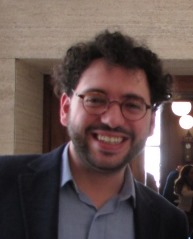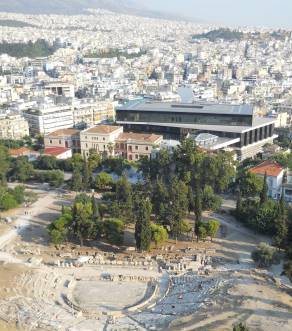
With the UK general election happening tomorrow 08 June 2017, we revisit a thought provoking culture article written by Benjamin Ramm on the 24th of April for the BBC's Global News website.
Benjamin Ramm is a member of the British Committee for the Reunification of the Parthenon Marbles and in the article entitled 'The X-factor of ancient Athens', he examines how everyday citizens became the judges of an ancient prize for drama that challenged popular opinion and rewarded subtlety and intelligence. He concludes that this was an experiment that shaped not just the theatre, but democracy itself.

The Theatre of Dionysus, situated at the foot of the Acropolis, could accommodate up to 17,000 audience members and was considered to have perfect acoustics
To read the full article, please visit BBC's Global News web site, here.
According to Professor Paul Cartledge, of the University of Cambridge and Vice-Chair for the BCRPM, Athenian theatre was "democracy in action". It describes the comedic genre as a combination of the bawdy and the satirical. Contemporary comparisons are revealing, particularly in relation to shows that involve voting. Cartledge says that, unlike The X Factor or Strictly Come Dancing, the performances were "a much more public, communal and collective political act. It was quite unlike the private experience of sitting in your own home, watching a distant event on television, where you're not face to face in conversation with your fellow judges and audience members."
Benjamin Ramm adds 'it is tempting to suggest that the playwrights achieved popularity without resorting to populism. Theatre was regarded as education for citizenship, and Athenians were wary about appeals to base political instincts – the city even instituted a practise called ostracism, in which potentially demagogic figures were voted into exile for a decade. Despite the presence of a chorus, the plays have no guiding narrator, and in true democratic style, present a variety of voices and arguments.'
Athenian drama continues to be a fertile source of inspiration and fellow BCRPM member, Professor Edith Hall describes Tony Harrison's 1998 film Prometheus as "the most important artistic reaction to the fall of the British working class". Adapted from a play often attributed to Aeschylus, the film is an imaginative interpretation of ancient myth against a backdrop of industrial decay. For Hall, "it provides overwhelming proof that capitalism and classicism need not go hand in hand".
Benjamin Ramm concludes that the 'theatre of democracy has a powerful global legacy, evident in the recent retelling of The Trojan Women by Syrian refugees. The women, exiled in Jordan, interweave their experiences into Euripides' ancient text. But which testimonies are theirs, and which are those of the women of Troy? Across cultures and time, from Athens to Amman, the performers are unified by their need to articulate the horrors of war. In the words of The Phoenician Women (408 BCE), from nearby Lebanon: "It is slavery not to speak one's thoughts."
Further reading, Democracy A Life, by Professor Paul Cartledge and Professor Edith Hall's Theatrical Cast of Athens.
For Benjaminn Ramm's interview with Professor Paul Cartledge after his book Democracy, A Life was published last year, visit here.

Comments powered by CComment